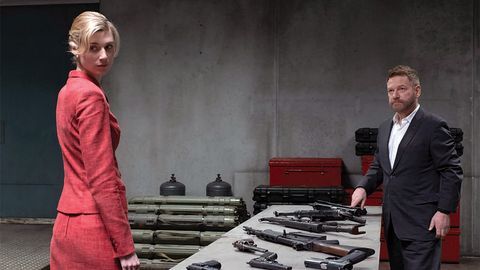We couldn’t have known during its conception or shooting, but Christopher Nolan’s Tenet winds up being a vessel for everything that is 2020. Tenet is about an existential struggle for the world’s future, and the experience of watching Tenet - a film in which execution can’t keep up with ambition – is a struggle as well. If you have seen the trailer, then you’ll know that time runs in both directions in Tenet. Nolan’s script contains many scenes of exposition and information delivery, but this central concept of “inversion” is first spelled out calmly by a scientist (Clemence Poesy) to an American agent (John David Washington) recruited for a special mission. Washington’s character is never named, instead he refers to himself and is referred to in the credits as “The Protagonist”. The choice to not give a main character a name is the first sign that Nolan has a reach vs. grasp problem here. Tenet in its most literal form is a genre film: there are secret agents, and beautiful women, and shadowy contacts, and did we mention all the globe-hopping? But the rectitude with which Washington plays the character, and the way that The Protagonist continuously is either explaining or having things explained to him suggests that Nolan views him as the delivery system for a large-scale fable, a story of how difficult choices and sacrifices must be made in order to protect us from our own worst instincts.
There is another movie inside Tenet, running not in an opposite direction but alongside with occasional intersections. The Protagonist’s mission crosses paths with Kat (Elizabeth Debicki), an art expert who is also the estranged wife of an arms dealer named Andrei (Kenneth Branagh). Kat would like to be well shut of Andrei, but his wealth means that he controls Kat’s access to their son. The emotional stakes of Kat’s situation are the easiest thing to take hold of in Tenet, and since Debicki has the clearest character arc to play it doesn’t seem like an accident that she also gives the film’s best performance. Kat is the closest that Tenet comes to an audience surrogate character, but as Andrei’s larger intentions become clear she is reduced to a prop for a large chunk of the film’s second half. It’s telling that Nolan just skips the scene in which The Protagonist and his partner Neil (a lively Robert Pattinson) explain everything to Kat, because (like the actual audience at this point) she would be very confused. The non-Kat sections of Tenet are much chillier on an emotional level, and the ending actually goes to great lengths to explain why that is the case. There is a rabbit hole of articles and podcasts to be gone down regarding Tenet, and an argument could be made about how the film justifies why Washington’s performance is the way it is – but all of that doesn’t make the film work any better.If one is going to write about film in 2020, then the idea of writing about the experience of watching it comes with the territory. Christopher Nolan’s insistence that Tenet open in theaters is understandable. This is a large-scale film with wide vistas and complex action sequences. But another scheduled 2020 release in which the biggest surprise is “John Cena plays (blank)’s brother!” delayed its release by a full year, and Nolan’s refusal to do the same risks undercutting years of audience goodwill. But there is another experiential problem with Tenet, and that is it is quite hard to figure out what is going on. The pounding score by Ludwig Goransson is doing a great deal of work here, but it is very loud in the mix and at times it is hard to understand dialogue. Andrei’s lines seem almost unintelligible on purpose during the scene where we learn how the multiple timelines are accomplished, and that choice eventually leads to a climax in which we see different characters going through different timelines in the same shot to no great storytelling effect. How did Tenet wind up being this muddy? I praised Nolan’s Dunkirk for its rigor, but here he seems to not only to have followed every whim but also to have been let down by his collaborators and his studio. The film landscape will look quite different whenever Nolan’s next film comes out – how films are distributed and viewed, etc. Christopher Nolan is talented enough to learn from experience, and going forward my wish for him is to find inspiration in restraint.






0 Yorumlar